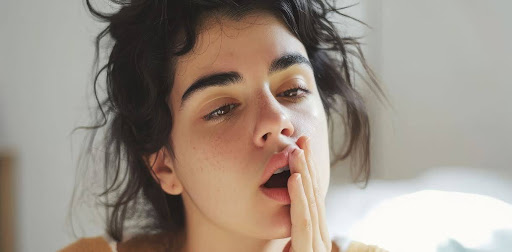Lip twitching is a minor, repetitive movement in the muscles surrounding your mouth. It may come on suddenly and last for a few seconds or for a few days. In most cases, it’s harmless; however, identifying why your lower lip is twitching can help you stop it sooner.
Common Causes of Lip Twitching
Lip twitches occur when facial nerves are triggered irregularly. Below are some common triggers:
- Stress and anxiety – mental tension overstimulates your facial nerves.
- Caffeine or nicotine – both stimulants activate your nervous system.
- Fatigue – lack of sleep fatigues muscles and makes them reactive.
- Dehydration – fluid levels are low in the body, and the nerves are not stable.
- Overuse of facial muscles – long conversations, chewing gum, or laughing for hours could result in lip muscle twitching.
- Some medications – mild spasms can occur with antidepressants or asthma medications.
In either case, whether it be lower lip twitching on the left side or on the right side, the reason is usually the same – strain of the nerve.
Is Lip Twitching a Sign of a Stroke?
Many people look for symptoms of a stroke, such as lip twitching. Having twitching alone is not a sign of stroke. A stroke occurs suddenly with apparent drooping on one side of the face, weakness of one arm, and difficulty speaking. If twitching occurs with these symptoms, get emergency help.
If twitching is the only symptom you can identify, you usually do not have any serious issues, and you can generally dismiss mild bottom lip twitching.
Why Is My Upper Lip Twitching?
Upper lip twitching is caused by stress, caffeine, or dehydration, but it can also occur after prolonged talking or eating spicy food that irritates facial nerves. Make sure you rest and hydrate, and you can use a warm compress to ease muscle tension.
How to Stop Lip Twitching Naturally
You can treat a twitch by making small changes each day:
- Decrease caffeine and nicotine intake. Sensory overload often increases nerve activity.
- Improve your sleep. Aim for a minimum of seven hours of sleep per night.
- Stay hydrated. Drinking water helps nerve signals flow smoothly.
- Eat foods high in magnesium. Foods such as nuts, seeds, and leafy greens keep fluidity in the muscles.
- Massage the involved area. Light, circular motion can decrease the tension.
- Clear your mind. Breathing exercises can reduce nerve firing.
If buzzing lasts more than a week or starts twitching a different part of your face, see a doctor.
Lip Twitching and Vitamin Deficiency
An unexpected cause of lip twitching includes vitamin or mineral deficiencies. Low levels of vitamin B12, magnesium, or calcium can be responsible for facial nerve irritation, leading to repeated twitching.
Magnesium loss can occur in individuals who skip meals, eat a rigid diet, or drink too much coffee. Vegetarians and those with digestive issues often have low levels of B12, which is the vitamin that protects the nerve coating.
Base your diet on eggs, fish, milk, almonds, and leafy greens. If twitching continues, discuss with your doctor about a blood test for those nutrients. Addressing a deficiency will typically resolve twitching naturally in a few days.
Spiritual and Emotional Meaning
Certain traditions associate the twitching of the lower lip with shifts in the emotional state of the individual, with twitching of the right side indicating good news and the twitching of the left side indicating emotional strain. From a medical standpoint, twitching of the lower lip is simply nerve overactivity, but stress management is still beneficial to your overall body and mind.
When to See a Doctor
Get checked if:
- The twitching lasts longer than two weeks.
- The twitching spreads to your eyes or cheek.
- You experience numbness, weakness, or pain.
- You see swelling or your face drooping.
Your doctor can check for vitamin deficiency, nerve irritation, or other issues.
Final Thoughts
In most cases, lip twitches are temporary and will resolve with rest, hydration, and nutrition. Pay attention to your body: generally speaking, once you address the problem, the twitch goes away. If your bottom lip has been twitching for over a week, consider your vitamins and habits with stress.
Also Read : Red bumps On neck | Causes of Red Spots on Your Neck

